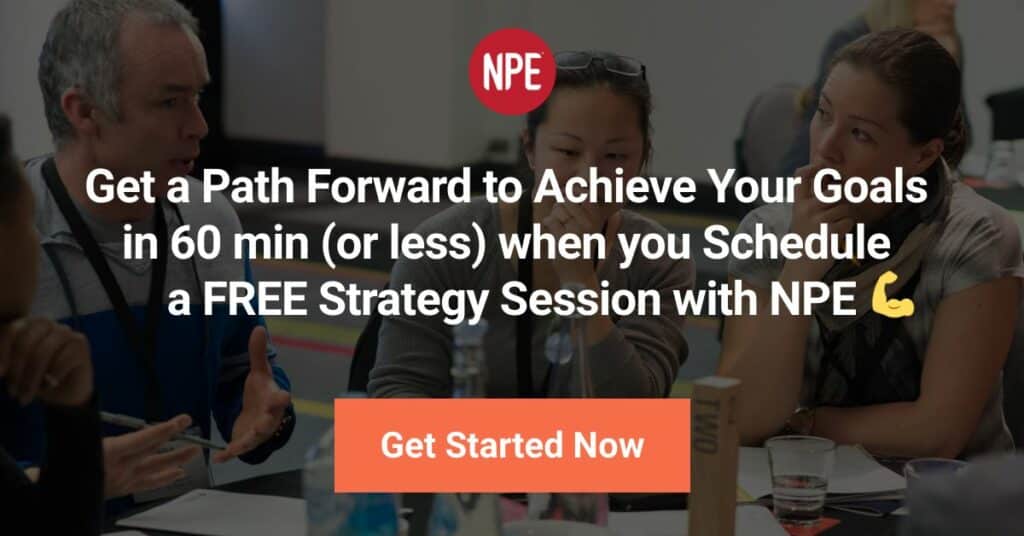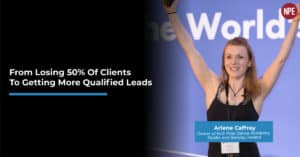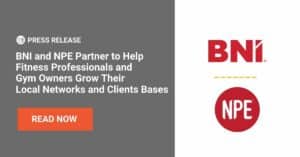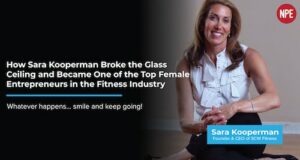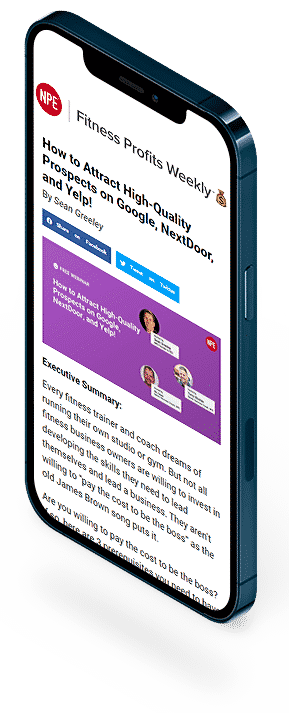Ep 23 – How Jess Cross Has Grown from 102 to 150 clients in 7 months (during COVID)
Jessica Cross’s new fitness studio wasn’t growing. She wasn’t sure of the best way forward.
She joined NPE to help her get direction for generating leads and getting systems in place to grow her business. Just as she started implementing her programs, COVID hit. She would be unable to keep her (practically new) studio open.
Working with her NPE Success Coach, Jess came up with a new business model. She created a great online service … and also offered outdoor training (which had been her specialty prior to opening her studio).
She improved her website along with the feedback from her coaches and NPE community members. By nailing down one goal at a time, she was able to grow rapidly. She went from 100 clients in February and March to nearly 150 clients in August. Her revenue grew from $17.8k/month to $25k/month!
In this episode, you’ll learn:
- How Jess started her personal training business from scratch and saved the money to open her own studio
- How she leveraged her strengths to change her business model during COVID-19.
- What she did to retain clients longer and keep engaged and happy
- The leadership skills Jess applied to get out of her comfort zone and become comfortable with selling
- How she put in place boundaries to separate friendships and business relationships with her clients (and that benefited her as a leader)
- And much more…
Have questions about your business now? Schedule a free ‘Get Clarity’ Strategy Session
It’s a crazy time for the fitness industry. No doubt you’re feeling stressed and overwhelmed trying to figure everything out. We understand your pain and we’re here to help. Learn more about getting the support you need to win by scheduling a FREE 60-min ‘Get Clarity’ Strategy Session now. Here’s how it works, during your session we’ll:
- Quickly assess where you (and your business) are right now. 🔍
- Together, we identify the biggest opportunities to create an immediate impact on your business and create a strategic plan. 📋
- We’ll show you the systems, tools, and coaching you can use to implement and drive results. 📈
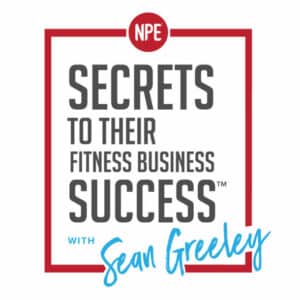
Secrets To Their Fitness Business Success Podcast
Podcast Transcript
Ric Isaac:
Well, hi, everyone. Welcome to NPE Secrets To Their Fitness Business Success Podcast. Today I’m joined by Jess Cross, who’s in New South Wales, but I’ll let you share what your business name is and where you’re located and the types of clients who you serve on the call here, Jess, but thank you so much for joining us today.
Jess Cross:
Thanks for that, Rick. My name is Jess Cross. I have a outdoor and PT studio in Mosman, New South Wales. My business is called Sportif Personal Training. We deal with a whole range of clients from young teenage girls all the way through up to some of our members are in their late 70s. We see… Oh, sorry. My daughter’s just poured my water bottle everywhere… see a wide range of clients, whether it’s training for an event or rehabilitation or just general everyday fitness.
Ric Isaac:
Yeah. Great. Well, I can’t wait to dive into this with you, because I’m clearly you do have a young daughter, which is awesome and lots of people listening to this are struggling with how they can juggle work and life, especially with the whole COVID-19 situation, whether they’re in lockdown or even if they’re not, schools are closed, some are open, how do they actually make this work, so looking forward to diving into this with you. Before we get into that side of things, let’s talk about prior to NPE, where was the business? What did it look like at that stage before you got on board with us?
Jess Cross:
Yeah, so I joined NPE the beginning of this year, the end of February. Sort of felt a little bit stuck on where my business… even though we were having a bit of growth, just felt like I just needed a bit of direction on generating leads and getting proper systems in place because I was starting to hire new clients, so since February to now, just even though I’ve been going through things at my own pace, just putting those systems in place has really helped set up all the foundations and the growth that I’ve had since. It pretty much doubled my sales per month since joining NPE, and then trying to get that work-life balance back. As you know, I’ve got a daughter and wanting to spend time with her, so I’ve been able to take Saturdays off and take that little bit of a step back, but still involved heavily in the business, but giving that time to myself.
Ric Isaac:
Yeah. That’s awesome. I’m going to ask you some more questions about that. I remembered on one of our earlier calls, Jess, we were reviewing your website and how your online presence was. What was that like having… I mean, it’s always a bit scary having someone look at the stuff that you’ve got out there with social media and online, but I know, I remember that call distinctly because you took away a lot of great info and made those changes. What was that experience like for you getting your online presence assessed and getting feedback?
Jess Cross:
Yeah, no, I think that was really helpful, and then also having whether it’s the getting race ready or the laser coaching calls every week, just being able to share… something just simple as sharing my screen with other people on the call who can give feedback on things that you might not necessarily see, but then also using some of the NPE partners like… Sorry… 97 Display and speaking with them and them giving me guidance on things that do and don’t work to help attract new members because that’s where I was feeling stuck was that I wasn’t getting a lot of… Even though a lot of my referrals have been… and clients have been through word of mouth, my website wasn’t really generating a whole lot.
Ric Isaac:
Well, let’s talk about that from an occasion because, as you said, you felt like you were a bit stuck. You were getting the occasional client, but as everyone does, losing the occasional clients are really a plateau point, but then as you mentioned in since February 2020, and where are we now, we’re in September, you’ve doubled your sales. There’s been some significant other changes that have occurred in the business as well. What about the physical locations, online locations, outdoor locations? How has that all morphed over this period of time?
Jess Cross:
I started my business for pretty much four years ago today, and it was all outdoors. It was a way for me to keep costs low. I didn’t have any overheads or anything like that. I’d purchased all the outdoor equipment outright, and my whole journey has been just growing through that and saving all that money to go towards my goal, which was to open a PT studio. Then I was outside for just over three years, and then November of 2019, I then opened a studio. Then that’s just given my existing clients… Even though I had PT clients before, it’s helped me upsell a lot of existing members into PT just having things like barbells and dumbbells and all the different cardio equipment there.
Jess Cross:
It’s just added something a little bit different for a lot of those members because they’re used to training outdoors. Even though we do use a lot of equipment out there, it just sort of… I found that that has been the best thing to help with my growth. Then it’s also then a lot of new members who don’t like outdoor training but like the fact that we do, say, PT. That’s also been something that’s helped grow the business. We have a PT studio now where we do all of our one-on-one. We’re doing a lot more semi-privates than what we were before. They’re the big changes that have been made over the four years.
Ric Isaac:
It’s an interesting one, isn’t it, because a lot of people who have had that traditional bigger group or bootcamp or just the typical group classes, I guess, that a lot of commercial gyms have, then there’s been a real shift from that because not everyone wants to be in that group environment, especially going through some sort of corona epidemic, or pandemic I should say. I mean, you just mentioned that you’ve doubled your sales every month in terms of what you’re doing. There’ll be a lot of people thinking, “Well, how did she do that during this whole COVID situation when there’s all this fear and stress and worry?” What did you actually do, and what were the significant changes to what you’d been doing previously that aligned with you to get those results, Jess?
Jess Cross:
I think probably one of the biggest things that helped me survive, and I guess you never really know what can happen, but just being prepared was my thing. I had a few clients that decided to isolate that little bit a little bit earlier, so I just took it upon myself to get all the systems in place with Zoom. I basically just set up a free group [inaudible 00:07:45].
Ric Isaac:
We’ve just lost you, Jess. Sorry. It’s just gone really quiet. Can I just hear you?
Jess Cross:
Can you hear me now?
Ric Isaac:
Yes. That’s much better.
Jess Cross:
All right. Okay. Sorry. Should I start again, or?
Ric Isaac:
No, no. That’s okay. You were saying [inaudible 00:08:05] Zoom, and you had [inaudible 00:08:07].
Jess Cross:
We implemented Zoom, so for my existing members, the thought of being outside wasn’t really a big issue because we hadn’t had our studio for that long, so for our PT clients to go outside, that wasn’t much of a much of an issue. Then because some of the bigger gyms were closing, a lot of those people were looking for an alternatives to train outside. Kind of feel like in the area that I’m in, not a lot of gyms offered a great outdoor option or an online auction, so I was able to use that to my advantage.
Jess Cross:
That was quite good in that respect. We started doing some online classes for those clients that didn’t feel comfortable even being in an outdoor setting, so we set that up. Then it was then another week that then everything had to go online, so we moved all of our groups and semi-private clients online. Then for our one-on-one clients, those that felt comfortable, because we could still train one-on-one clients outside, we still offered that option, or they felt more comfortable on Zoom, we did it by Zoom.
Jess Cross:
I think the feedback from my members, the fact that I always kept them updated with everything that was going on, whether it was from Fitness Australia or New South Wales Health, they’re really appreciative for that, and just the fact that I turned things around pretty quick. I think maybe some other gyms maybe were a bit too slow to react and then people canceling their memberships or wanting to put them on hold until things changed, which I did get some people like that, but after a while, they decided to come back because they were stir-crazy just being inside and things like that. I think and then just also the support from NPE and just keeping accountable to coming to the weekly, weekly calls and bouncing or hearing other people’s struggles and triumphs and implementing some of the things that worked for other people across to your own business I think has just been something that’s really helped.
Ric Isaac:
It’s interesting you said they’re the start that your members really appreciated your communication and being able to keep them up to date with what was going on. You also, as you said, pivoted really quickly because you recognized that there was going to be a challenge that it was some of them, which is brilliant. You’re able to embrace that. A lot of people listening to this, maybe some have or maybe some waited a bit too long or maybe some haven’t actually done it yet. How has that been for you to having that as an online service delivery? How did you find that experience? Clearly, you had to learn different ways of doing things and ways of being able to over-deliver. Just share a little bit more about how that all worked, Jess.
Jess Cross:
I think it just adds another, or now, it certainly adds another element to your business. I mean, I have now clients when they, say, have the COVID test and can’t come and see us, even though it’s, say, a negative result that they’ve got to isolate for, say, three days, client is still wanting to train… I feel fortunate that clients are still wanting to train via Zoom. They’re just not coming into the studio.
Jess Cross:
Then things like, say, school holidays where I previously would have… or people going on holidays and now liking the idea that they could just pack a TRX or a weight in their bag or what have you, and we can just connect pretty much depending on… I mean, obviously, international travel is not an option at the moment, but depending on the time difference, just adjusting the time. A lot of clients that I previously would have paused their payments for going on holidays and things like that I haven’t had to do, so then I’ve noticed my sales are a lot higher than… Especially this past [inaudible 00:12:43] holidays, we just had it… because I normally have a lot of members going to Europe for the summer, and that’s sometimes four weeks worth of memberships that go on hold there, so having that option, and even though… Sorry… now that people may be only going away for a week, they’re happy to connect on Zoom and do the sessions.
Ric Isaac:
I mean, that’s super powerful, isn’t it, if anyone who’s in a personal training or semi-private space or who’s wanting to move into that because a lot of people are shifting their model away from that larger group, but that’s massive, isn’t it, because that cashflow impact of holidays, and generally you’re working with people who are affluent or affluent, have disposable income, so they’re the ones who do travel or at least go on holiday a lot more. That’s massive. Have you been able to quantify what the difference has been in terms of your yearly revenue from that or what saved you or meant that you can continue to get that cash in?
Jess Cross:
Yeah, just going off, I actually just did my tax return and just looking at the projections just from even just following the NPE Cash Dash tool, it’s going to be an extra 250,000 a year, not just from like those people not being on holidays, but from the new members. It’s a big change.
Ric Isaac:
250,000, I mean, it’s massive. That’s huge. It’s additional to what you were doing before. I mean, that’s really exciting. I know during this time as well, you’ve brought on some new team members to support you so that, as you mentioned a few minutes ago, you can have that work-life balance as well. You don’t have to train on Saturdays, which was one of your goals I remember what we first spoke. What’s that been like bringing them on board and having to let go of some of those things that sometimes we don’t want to because it’s our baby and you’ve… Tell us a little bit about that.
Jess Cross:
I think it’s something that I’ll always struggle with because it’s something that I created. Obviously, it was just me when I first started for a couple of years, and then as I’ve grown, added two other personal trainers into the mix, and then I have separate yoga and Pilates instructors, but their involvement is a little bit a little bit less. They’re only doing a couple of hours per week, but that’s another thing with NPE as well, just giving me that… because that’s my weaker side of things is just leadership. I’m just somebody that’s a doer, and I feel bad to say no to clients. That’s one thing that I’m really trying to work on is not just trying to get the sale, that I always have to take it on and trying to offload a lot of that load.
Jess Cross:
I mean, I still do work in the… I still do like 35 hours of PT at the moment, including groups, but I’m obviously wanting to take that step back, but working with yourself and Rachel, just giving me tools to help slowly come back and let the other staff take on more responsibility of training people and getting out there, getting new clients, not just all being on me.
Ric Isaac:
That’s an awesome thing. I mean, it’s worth pausing for a second, isn’t it? Vast majority of fitness businesses have really struggled through this pandemic, and a lot of them, unfortunately, have had to close and probably not going to reopen, but during that time for you, you’ve grown, you’ve added 250,000 in terms of your yearly revenue to your existing revenue, and you’ve been able to not only keep your staff, but now you’re continuing to provide them with more hours as well so that they’re happy because a lot of staff members lost their job, didn’t they, because the facility closes down, well, there’s no work, so that’s huge that you’ve been able to do that. That’s really impressive.
Jess Cross:
Yeah. No, I think it’s been… I just feel lucky because I guess you just never know what can happen, but I think just having a supportive team behind you as well makes a big difference and having the right people with you. I just really believed hiring people that are just good people. Teaching them how you want to do things is easy, but just making sure you got those good quality people with you.
Ric Isaac:
It’s something we talk about it a lot, isn’t it? You hire on personality and attitude, and obviously, they need to have basic qualifications and those sorts of things [inaudible 00:17:53] experience as well, but it’s aligning them to the core values of the business, isn’t it, which is so critical. As you said, they’ve got to be good people, and that’s how that you’ve been able to develop that community just within your team has been really good.
Jess Cross:
Yeah. No, it’s definitely a hard thing to… It’s not easy, and that’s one thing that I struggle with because you want to be their friend and make it a great place to work, but then just trying to set the boundaries of being professional and all just working together and just having people that are passionate about what your goal of the business is and achieving what they want out of their career as a personal trainer.
Ric Isaac:
Well, that’s a significant difference, isn’t it, because lots of businesses, it’s almost as if… or sometimes you are competing, aren’t you, because it’s not really structured well, but you’ve been able to structure it so that they have bought into the vision and they love what you’re doing and love the learning and an opportunity that you’ve been able to give them, and everyone is pulling in the right direction. How much of that has come down to having the right systems, as you said earlier, as well as having the right people?
Jess Cross:
I think one thing that I did during lockdown was try to create I guess what I’d call like a standard operating procedure and just little things for me when I was on my own or in my head and is just built into me how I want things to be done, and it’s something that I have learned over the years of having different people working with me, just trying to have that clear communication because a lot of the members are so used to how I would do… Just something as small as like how you set up, say, a group class, that makes a big difference, and making sure that the staff, that they’re introducing members to other members and making everyone feel welcome and not having this intimidating environment that they’re walking into, making sure that it’s a fun and enjoyable place to train.
Jess Cross:
I think just little things, just little [inaudible 00:20:26] like just the basics, which I think a lot of people don’t know how to do and getting clients, or sorry, trainers, sorry, to message clients after, whether it is a PT session or a group class giving them that feedback and encouragement and accountability to how they’re going in. Then some people that might not be turning up as often, sending them a message.
Jess Cross:
I had one girl who I hadn’t seen in about a week and a half. I sent her a message. She just wrote back to me just then and sent me this long text just saying how grateful, how thankful, sorry, she was that I’d thought of her and messaged her. She actually hadn’t been feeling well and how she was feeling about coming back to training and could I help her with something. I think just those little things, and I think that’s also has been what has helped me as well through this is just always having that constant contact, members and staff.
Ric Isaac:
You mentioned that earlier, I mean, in terms of your communication with the members, not just around COVID, but as you’ve just explained that, that over-delivery, isn’t it? It’s really showing them that you genuinely care and those touch points after the sessions because, as you said, it’s relatively… most people are focused on what happens in the session, “Am I delivering great value,” which is obviously an important part of it, but it’s that over-delivery that you do that just creates that sense of massive value for people, isn’t it? How is that gone now that you’ve been doing that even more and your instructors, you’re trying [inaudible 00:22:14]. Have you noticed a difference in your retention in terms of percentages or anything like that?
Jess Cross:
My retention has always been pretty high. The only reason why I do tend to maybe lose clients is if they’re moving out of the area or sometimes there have been an issue with something that has happened or whether it’s with, say, myself or another trainer or within the group that come, but I think just having the staff that are really… making sure that your staff are invested in that client’s result, and I think just giving that support to the client.
Jess Cross:
I said to one of the new girls that started with me, “The most important thing at the beginning is you’re not there to be the client’s friend. You’re wanting to help them work towards a goal.” When you get to that stage where you’re… not comfortable, but you have this great rapport with them in those initial stages of training somebody new. I think you’ve just got to really over-deliver. Not that I fluff around, but once you kind of… I’ve got clients I’ve trained for eight years whereas now, our sessions are a little bit lighter, but still keeping them accountable kind of thing.
Ric Isaac:
I mean, it’s a real concern for a lot of people. I know you had these concerns as well as know when you’re giving up part of your baby, so to speak, and you’re relying on others to be able to deliver on that great service. As you said, you’ve got the right people, and you’ve got them doing and following the right systems and procedures, and now you can be really comfortable knowing whoever they work with, they’re going to get great service, and your brand and your name, which is associated with it, is going to be represented in the best light.
Jess Cross:
Yeah, exactly. I mean, it can just be something as simple as… I always have my clients, I’ve always got the same… They always train at the same time every week, like nothing ever changes. Even just something so small, if you’re needing to change someone’s time and you do it one too many times, it can really put a bad note in that person. We have had a situation like that where one of the girls that… She still works with me… but changed someone one too many times, and unbeknownst to me, he then called me one day and just said, “I want to cancel. I’m not happy.” There was nothing I could do about it, but it’s just making sure your staff know that professional standard. I mean, I don’t ever cancel on a client unless there’s obviously something big or what have you that comes up or-
Ric Isaac:
You’re on your death bed or something like that, or-
Jess Cross:
Or-
Ric Isaac:
… been in a car accident or…
Jess Cross:
Yeah. I think clients are understanding to a certain point, but it can just be simple thing of customer service, which can sometimes go wrong. I think it’s just doing the simple things right is what people really appreciate.
Ric Isaac:
Yeah. I mean, I think you nailed it earlier with that. You can’t over-communicate, can you, if you’re sharing this stuff, you’re staying in touch where you’re giving them feedback after the sessions. Then it’s not just reliant on that session. They fall in love with the business and not any one trainer as well because that’s a big fear of a lot of people in the industry isn’t it, that, “Well, if I bring someone on and they start working with my clients, and then I bring in new clients, well, then they could just go and do it themselves and take all their clients with them,” which unfortunately does happen in some situations, but you’ve got the team so bought into the vision and what you’re trying to achieve, and they’re all working towards that because that means more opportunity and benefits for them as well that everyone’s working or singing to the same hymnbook, so to speak.
Jess Cross:
Yeah, exactly. I mean, it can be inevitable that people are going to move on and do what have you, but I think as a business owner, I think it’s just really important to still… even when you do take that step back, still making sure that you’re showing face and people know who… It’s really important to me that even though sometimes I haven’t met some members that I go to a group class that they’re at and go and introduce myself and meet them because now I’m more in the studio as opposed to outside now, so sometimes I don’t always get to meet the people straight away, but I think it’s really important that clients know who you are.
Ric Isaac:
Yeah, which is a hard one, isn’t it, because, again, that’s… Well, it’s really exciting to hear you say that there’s some clients you don’t know, but there’s also for some people fear associated with that as well because what’s happening with them, are they getting looked after? I think that’s what’s been so obvious to us watching you from a coaching perspective is that even though the business has grown considerably, and clearly not just in client numbers, but in revenue as well, and you guys are busy and your trainers have got more hours, and everyone, the clients are loving it because it’s still that over delivery. It hasn’t been watered down the busier you’ve got because you’ve got those systems in place now that have been able to make sure that happens across the board.
Ric Isaac:
That must make you feel great as well, knowing that, well, you don’t even need to be involved in the process. You haven’t met the client. Someone else has taken them through the sales process. They’ve got them signed up into whatever program they need, and then they’re getting really well looked after. It’s not that they forget you because they do know who you are because you’ve reached out that way, but must help you to sleep well at night, I imagine.
Jess Cross:
Yeah. I mean, my thing is I always want to meet the people, like I don’t want to be… I know that when I went on maternity leave, there was people that I was signing up without being there. It was all on the phone and going to trial sessions and things like that. When I came back at, I felt like I wasn’t coming into my own work [inaudible 00:29:08] because there was a few new members that didn’t know who I was and weren’t used to, say, how I would normally train people, but I just think it’s really important to know who everybody… At least meet them and being in touch with everybody and checking in and seeing how they’re enjoying their training and things like that. I think that’s really important.
Ric Isaac:
It’s very powerful, isn’t it, still showing them how much you want to meet them and that you care about them. It’s not just, “Well, I’ve got your money now, and you can do it with someone else.” That’s really significant. I want to appreciate your time here. I know you’ve got some quality time with your little one as well, but what would you say to others who they’re in a situation where they’re either just starting in their business or they’ve been going for a while like you had, and they really aren’t getting to where they want to be. What would your advice be to them, Jess?
Jess Cross:
I guess for me, my journey, I guess, I did start in a gym working for somebody and getting to understand how… I mean, a lot of the systems that I’m learning or doing with NPE, I had a little bit of experience on with my first PT role and just understanding what… getting that experience and building up that client base with… I think my thing is I’ve worked at two different gyms in the area and got to know a lot of people in the community, so that’s a big thing is just trying to build that reputation for yourself as the as a trainer first. I was in gyms for about four, five years before I went out on my own.
Jess Cross:
I mean, I would probably say don’t be afraid to start small because I feel like for me, that’s been the best thing that I’ve done, starting with, say, low overheads as opposed to… I couldn’t imagine opening a brand new space and not having any members or a client base and things like that to build from. Things like that, and just not be afraid to just get out there and just do everything and make relationships with whether it’s, say, a Lululemon or like-minded businesses in the community that want to see you grow and work having a reciprocal arrangement, which is what I did, and that really helped get my name out there when I started my business and then just keep plugging away because it does… You get to that two, three years in business, and you feel like you’re in this ground where you’re not really moving, but my thing would be to just keep going.
Jess Cross:
I mean, now I wouldn’t even look back. It’s the greatest decision I’ve ever made, but I think don’t be afraid to go and get experience working with other people and see what other businesses do, and then really let that vision of what you would want a fitness business to be, be shaping your business is or what you want it to do.
Ric Isaac:
That’s great advice. I know there’s lots of people who are stuck, so to speak, and they’re just treading water and not really moving forward or not really moving backwards, although as we know, you’re moving in one direction. We’re not ever staying still. That’s awesome. Well, look, it’s been phenomenal to see your growth since February for you to have achieved what you have, especially, I mean, that’s outstanding, adding that 250,000 in yearly revenue to the business model whilst we’ve gone through the worst pandemic that hit the industry ever, arguably. That’s really significant. I love the fact that you’re now able to have your weekends and spend quality time-
Jess Cross:
Thank you.
Ric Isaac:
… with your daughter and obviously your husband as well and just the fact that you’ve achieved some of those goals you set in a really short space of time. The other thing too, I mean, there’s so many people who really need help. As you mentioned earlier, the gyms are closing around them, those that had a break have realized, “Well, this is horrible. I feel terrible now,” the mental health issues that are all popping up everywhere with the isolation and all of that, that comes with it. I mean, it’s an amazing community service that you’re delivering, and you really are changing lives every day, Jess, so well done, and-
Jess Cross:
Yeah. Thank you.
Ric Isaac:
… congratulations on your success.
Jess Cross:
Yeah. Thank you. No, thank you, guys, for all your support. I just really enjoy being a part of the community. I think just having that accountability, especially as a business owner, you can slack off a little bit, but no, it’s really good to just have that support to help you grow to what you want to do.
Ric Isaac:
Well, I love it. We’re going to keep working on developing you into an even stronger leader so that you’re able to take the business because I know you’ve got new goals and dreams now and much bigger goals, which is really exciting. Watch your space to any of you that are listening or watching to this because Jess is going places. But right now, I will let you have your quality time with your daughter back. Thank you so much for jumping on to the podcast for this, Jess, and we’ll speak to you again very soon.
Jess Cross:
[inaudible 00:35:00] thanks, Ric.
Ric Isaac:
All right, take care.

